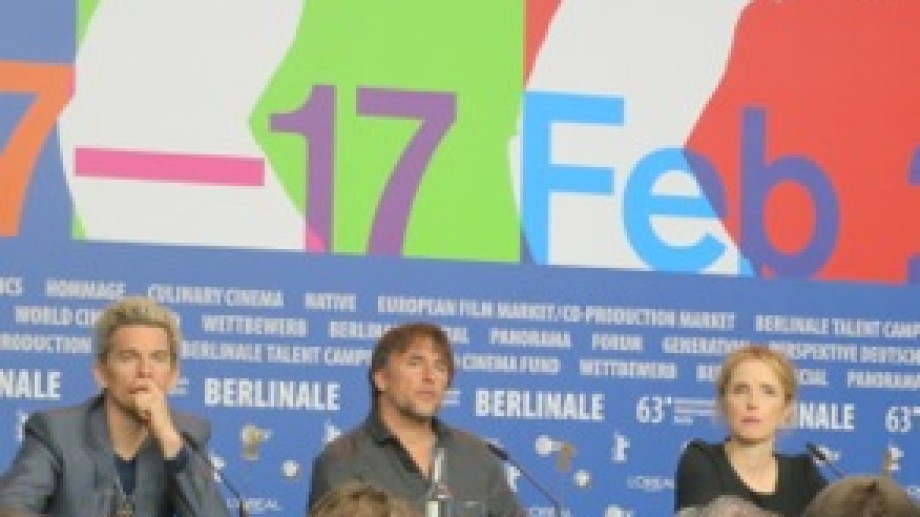
Ethan Hawke, Richard Linklater and Julie Delpy in Berlin Monday. Photo: Brian Brooks
An accidental death after hitting someone while at the hands of a wheel accentuates a complex relationship between mother and son. That scenario formed the backdrop of two otherwise different movies that debuted in competition at the Berlinale Monday. Pia Marais's Layla Fourie by puts a working class South African spin on the story, while Romania's Child Pose by Calin Peter Netzer is steeped in the bourgeoisie. Also in Berlin Monday, Ethan Hawke, Julie Delpy and director Richard Linklater added a bit of glitz as they ushered in the week with the third installment of their Before series. Before Midnight appeared to win over audiences here with its return to the talkative couple whom audiences first met on a train headed to Vienna 18 years ago in Before Sunrise.
Before Midnight
First there was a romantic meeting on a train to Vienna in Before Sunrise (1995) and then a rekindling of that spark nine years later in Before Sunset (2004). Now on the tail end of a summer vacation with their two daughters in Greece, Jesse and Celine are no longer young lovers, but their typical banter, philosophizing, arguments, jokes, mini-tantrums and passion are still in full splendor, albeit with the hindsight of middle age coming into play.
As with the earlier installments, director Richard Linklater collaborated on the script with stars Ethan Hawke and Julie Delpy, and the emotional complexities of a specific stage of life once again formed their canvas.</p>
“We created these characters 18 years ago, and every six years or so we think these people have something to say,” Linklater said Monday in Berlin. “There's an element of time that these characters are able to revisit, but they're all just a moment in time,” added Delpy.

Ethan Hawke and Julie Delpy in Richard Linklater's Before Midnight
Along with Hawke, the three packed in a busy afternoon news conference after a full screening of the film that debuted a couple of weeks ago at the Sundance Film Festival. After two successful runs with the chattering couple, when word came out that a Before Midnight was in the works, audiences took to social media offering up their versions of where Jesse and Celine would be in their lives. Expectations added a new element as the trio set out to create Midnight.
“One of the things most difficult about the third movie was what people were expecting,” noted Hawke. “There were a lot of people talking about what they thought Jesse and Celine would be and many scenarios of how we could go with this.” Added Linklater, “we spent most of our time rejecting our ideas.”
Though the Before series is fiction, the trio hinted that some elements in the dialogue point to kernels of reality. “There's a seed of truth,” offered Delpy. “There were things in Before Sunrise that were in my journals at 18 that ended up in the movie. There's a seed of truth that grows to a tree of fiction.”

Layla Fourie director Pia Marais (right) with actors Rapule Hendricks, Rayna Campbell and Rapulana Seiphemo. Photo: Brian Brooks
Layla Fourie
South African actress Rayna Campbell stars as a struggling single mother who gets a job with a company specializing in lie detectors and security after completing a polygraph operation course. Hoping to build a new life with her young son away from the grittiness and crime of Johannesburg, she is instead swirled into a web of lies and deceit after she accidentally hits a man on a dark countryside road. Though not explicitly stated, Layla is ensnared with the ghosts of Apartheid. The fact she has accidentally killed a white man exacerbates her fear of losing her son. In one particularly tense scene, Layla enters a police station, presumably to confess, but fear paralyzes her.
“The intention of the story wasn't to make an explicitly political film, but the scene at the police station was meant to recall South Africa's Apartheid past,” said director Pia Marais on Monday. Added actress Terry Norton, “It's a very violent society and life is very cheap. Drugs have moved in in a big way and there's a lot of gangsterism. Everybody thought there would be reconciliation and we would be a rainbow nation, but it's more complicated than that. But we can start change by telling our stories.”

Luminita Gheorghiu in Calin Peter Netzer's A Child's Pose
A Child's Pose
Romania finally took a different spotlight here with the debut of its competition entry by Calin Peter Netzer, though the filmmaker lives in Germany. The country has hit daily headlines in Europe because it is thought to be the source of a horse meat scandal in frozen food in the UK. In Child's Pose, actress Luminita Gheorghiu plays a domineering mother trying to save her son from jail. As the story unfolds, Netzer reveals the easy corruption and conspicuous materialism prevalent in post-communist Romania's upper middle class, which takes for granted its ability to pay their way out of any crisis.
Through the film's social satire and diligent focus on the main characters' neuroses, the film maintains the traditions of Romania's New Wave, which has been celebrated by audiences at the Cannes, Berlin, and New York Film Festivals and beyond.
In the film, Cornelia (played by Gheorghiu) uses her social connections and cold hard cash in her attempt to win back the love of her son Barbu after he accidentally kills a boy while speeding on a road outside the capital, Bucharest.
“I don't think this is a problem specific to Romania,” Gheorghiu said in Berlin, as quoted by Reuters. “There are mothers like this everywhere… who are victims of their unconditional love for their child.



